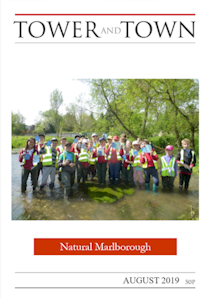

Tower and Town, August 2019 (view the full edition) (view the full edition)Nature: An Asset, Not An IssueDespite what I now know to be a constructed landscape, the creation of which has contributed to sweeping declines in biodiversity, the rolling patchwork farmland of the Marlborough downs shaped my understanding and appreciation of nature. It was evident that everything had a place. The badger in its sett, buzzard in its tree, bumblebee in its meadow. Each animal played its part and made the landscape what it was; what I would now describe as delivering ecosystem function. This bucolic vision is obviously shrouded by childish misinterpretation, and by now a fair share of retrospective embellishment of memory, which adds to the poetry of it all, but doesn't detract from the fact that some of my most abiding memories relate to events where people intentionally damaged nature. I remember the hunts, the spraying of pesticide, corvid traps, poisoned badgers. Conserving nature is not just a question of morality, but a fundamental requirement; it's not hyperbolic to state that we are entirely dependent upon nature to survive, yet we consistently degrade it. As an ecologist I suppose it is therefore my role to counteract this as far as possible, either through enforcing the rules or educating those most likely to cause an impact. My work has several focuses. We are most often engaged to support new development schemes, identifying ecological constraints in relation to legal and planning policy compliance, and finding solutions which enable works to proceed whilst protecting and improving biodiversity. This whole approach may be subject to change in coming years. The emergence of a concept known as Biodiversity Net Gain represents a potential tipping point. The idea, put forward in a consultation in late 2018, is that measurable gains in biodiversity (assessed using a metric which calculates the value of an area of habitat based on its type, condition and quality) are delivered on all new development schemes and enshrined in legislation. Time will tell as to how BNG is applied (I'm helping to write guidance on it and am still none the wiser myself), and importantly how effective BNG is in improving the state of nature in the UK, but it's a good first step; albeit 60 years, thousands of hectares of irreplaceable habitat, and millions of birds, bats and invertebrates too late. The end goal should be for nature to be seen as an asset, something to be valued, improved and protected, not an issue, something to be 'dealt with' in planning and kept away from where we live and work. I'd encourage everyone to do their part in helping to deliver this. Garden for wildlife, put up a bird box, lobby your local MP, or become an ecologist. Morgan Taylor |